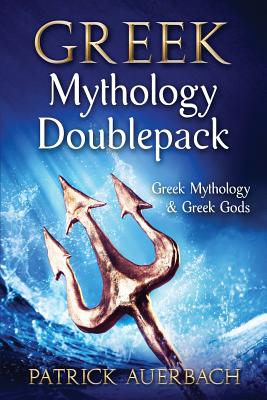Greek Mythology: Doublepack - Greek Mythology & Greek Gods

Greek Mythology: Doublepack - Greek Mythology & Greek Gods
2 Manuscripts Book 1: Greek Mythology - The Ancient Myths and Legends of Greek Mythology
Greek Mythology is the body of myths and teachings that belong to the ancient Greeks, concerning their gods and heroes, the nature of the world, and the origins and significance of their own cult and ritual practices. It was a part of the religion in ancient Greece. The Greeks were polytheistic in their religious beliefs. Polytheistic means they believed in and worshiped many different gods. Modern scholars refer to and study the myths in an attempt to shed light on the religious and political institutions of Ancient Greece and its civilization, and to gain understanding of the nature of myth-making itself. In Greek Mythology, the gods often represented different forms of nature. Their religion/mythology had no formal structure with the exception of various festivals held in honor of the gods. There was no sacred book or code of conduct to live by. The most powerful Greek gods were known as the Olympians. The Greeks believed the Olympians lived on the highest mountain in Greece, Mount Olympus. The Olympian gods included: Zeus, Hera, Apollo, Aphrodite, Ares, Artemis, Athena, Demeter, Hades, Hermes, Hephaestus, Poseidon and Hestia or later she was replaced in some lists by Dionysus. Greek Mythology is explicitly embodied in a large collection of narratives, and implicitly in Greek representational arts, such as vase-paintings and votive gifts. Greek myth attempts to explain the origins of the world, and details the lives and adventures of a wide variety of gods, goddesses, heroes, heroines and mythological creatures. These accounts initially were disseminated in an oral-poetic tradition; today the Greek myths are known primarily from Greek literature. The oldest known Greek literary sources, Homer's epic poems Iliad and Odyssey, focus on the Trojan War and its aftermath. Book 2: Greek Gods - The Gods and Goddesses of Greek Mythology
The ancient Greeks believed there were a great number of gods and goddesses. These gods had control over many different aspects of life on earth. In many ways they were very human. They could be kind or mean, angry or pleasant, cruel or loving. They fell in love with each other, argued with each other and even stole from each other. The ancient Greeks built great temples and sanctuaries to their gods. They held festivals in their honour, with processions, sports, sacrifices and competitions. Stories of the gods' exploits were
PRP: 105.63 Lei
Acesta este Prețul Recomandat de Producător. Prețul de vânzare al produsului este afișat mai jos.
95.07Lei
95.07Lei
105.63 LeiLivrare in 2-4 saptamani
Descrierea produsului
2 Manuscripts Book 1: Greek Mythology - The Ancient Myths and Legends of Greek Mythology
Greek Mythology is the body of myths and teachings that belong to the ancient Greeks, concerning their gods and heroes, the nature of the world, and the origins and significance of their own cult and ritual practices. It was a part of the religion in ancient Greece. The Greeks were polytheistic in their religious beliefs. Polytheistic means they believed in and worshiped many different gods. Modern scholars refer to and study the myths in an attempt to shed light on the religious and political institutions of Ancient Greece and its civilization, and to gain understanding of the nature of myth-making itself. In Greek Mythology, the gods often represented different forms of nature. Their religion/mythology had no formal structure with the exception of various festivals held in honor of the gods. There was no sacred book or code of conduct to live by. The most powerful Greek gods were known as the Olympians. The Greeks believed the Olympians lived on the highest mountain in Greece, Mount Olympus. The Olympian gods included: Zeus, Hera, Apollo, Aphrodite, Ares, Artemis, Athena, Demeter, Hades, Hermes, Hephaestus, Poseidon and Hestia or later she was replaced in some lists by Dionysus. Greek Mythology is explicitly embodied in a large collection of narratives, and implicitly in Greek representational arts, such as vase-paintings and votive gifts. Greek myth attempts to explain the origins of the world, and details the lives and adventures of a wide variety of gods, goddesses, heroes, heroines and mythological creatures. These accounts initially were disseminated in an oral-poetic tradition; today the Greek myths are known primarily from Greek literature. The oldest known Greek literary sources, Homer's epic poems Iliad and Odyssey, focus on the Trojan War and its aftermath. Book 2: Greek Gods - The Gods and Goddesses of Greek Mythology
The ancient Greeks believed there were a great number of gods and goddesses. These gods had control over many different aspects of life on earth. In many ways they were very human. They could be kind or mean, angry or pleasant, cruel or loving. They fell in love with each other, argued with each other and even stole from each other. The ancient Greeks built great temples and sanctuaries to their gods. They held festivals in their honour, with processions, sports, sacrifices and competitions. Stories of the gods' exploits were
Detaliile produsului










